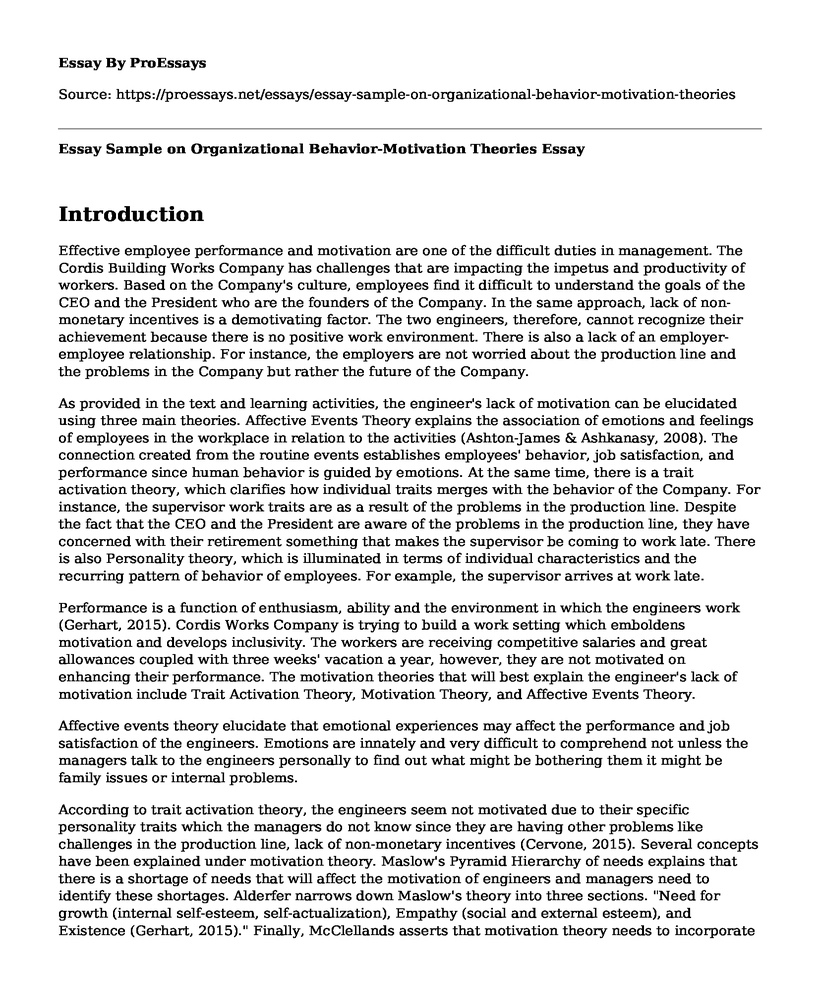Introduction
Effective employee performance and motivation are one of the difficult duties in management. The Cordis Building Works Company has challenges that are impacting the impetus and productivity of workers. Based on the Company's culture, employees find it difficult to understand the goals of the CEO and the President who are the founders of the Company. In the same approach, lack of non-monetary incentives is a demotivating factor. The two engineers, therefore, cannot recognize their achievement because there is no positive work environment. There is also a lack of an employer-employee relationship. For instance, the employers are not worried about the production line and the problems in the Company but rather the future of the Company.
As provided in the text and learning activities, the engineer's lack of motivation can be elucidated using three main theories. Affective Events Theory explains the association of emotions and feelings of employees in the workplace in relation to the activities (Ashton-James & Ashkanasy, 2008). The connection created from the routine events establishes employees' behavior, job satisfaction, and performance since human behavior is guided by emotions. At the same time, there is a trait activation theory, which clarifies how individual traits merges with the behavior of the Company. For instance, the supervisor work traits are as a result of the problems in the production line. Despite the fact that the CEO and the President are aware of the problems in the production line, they have concerned with their retirement something that makes the supervisor be coming to work late. There is also Personality theory, which is illuminated in terms of individual characteristics and the recurring pattern of behavior of employees. For example, the supervisor arrives at work late.
Performance is a function of enthusiasm, ability and the environment in which the engineers work (Gerhart, 2015). Cordis Works Company is trying to build a work setting which emboldens motivation and develops inclusivity. The workers are receiving competitive salaries and great allowances coupled with three weeks' vacation a year, however, they are not motivated on enhancing their performance. The motivation theories that will best explain the engineer's lack of motivation include Trait Activation Theory, Motivation Theory, and Affective Events Theory.
Affective events theory elucidate that emotional experiences may affect the performance and job satisfaction of the engineers. Emotions are innately and very difficult to comprehend not unless the managers talk to the engineers personally to find out what might be bothering them it might be family issues or internal problems.
According to trait activation theory, the engineers seem not motivated due to their specific personality traits which the managers do not know since they are having other problems like challenges in the production line, lack of non-monetary incentives (Cervone, 2015). Several concepts have been explained under motivation theory. Maslow's Pyramid Hierarchy of needs explains that there is a shortage of needs that will affect the motivation of engineers and managers need to identify these shortages. Alderfer narrows down Maslow's theory into three sections. "Need for growth (internal self-esteem, self-actualization), Empathy (social and external esteem), and Existence (Gerhart, 2015)." Finally, McClellands asserts that motivation theory needs to incorporate achievement, authority motivation and relationship motivation which lacks in the company.
The CEO and President must understand each workers' personality trait and give them roles that align with their character traits (Ashton-James & Ashkanasy, 2008). The second thing is improving worker and employer relationship which seems to be lacking in the company. The third aspect is by allowing the engineers to raise concerns that may be affecting them like the production line not working effectively might be a demotivating factor for them.
References
Gerhart, B., & Fang, M. (2015). Pay, intrinsic motivation, extrinsic motivation, performance, and creativity in the workplace: Revisiting long-held beliefs. Annu. Rev. Organ. Psychol. Organ. Behav., 2(1), 489-521.
Cervone, D., & Pervin, L. A. (2015). Personality, binder-ready version: theory and research. John Wiley & Sons.
Ashton-James, C. E., & Ashkanasy, N. M. (2008). Chapter 1 Affective events theory: a strategic perspective. In Emotions, ethics, and decision-making (pp. 1-34). Emerald Group Publishing Limited.
Cite this page
Essay Sample on Organizational Behavior-Motivation Theories. (2023, Jan 16). Retrieved from https://proessays.net/essays/essay-sample-on-organizational-behavior-motivation-theories
If you are the original author of this essay and no longer wish to have it published on the ProEssays website, please click below to request its removal:
- Research Paper on Post-Traumatic Stress Disorder on Rape Victims
- When Photographs Create False Memories Essay
- Psychological Analysis of Movie With Mental Illness Paper Example
- Foreign Direct Investment in Saudi Arabia Paper Example
- Essay Sample on John Locke's Theory Of Personal Identity
- Essay on Incompetence of Andrew Wakefield's Autism
- Essay Example on Understanding Human Behavior: Social Cognitive Theory







